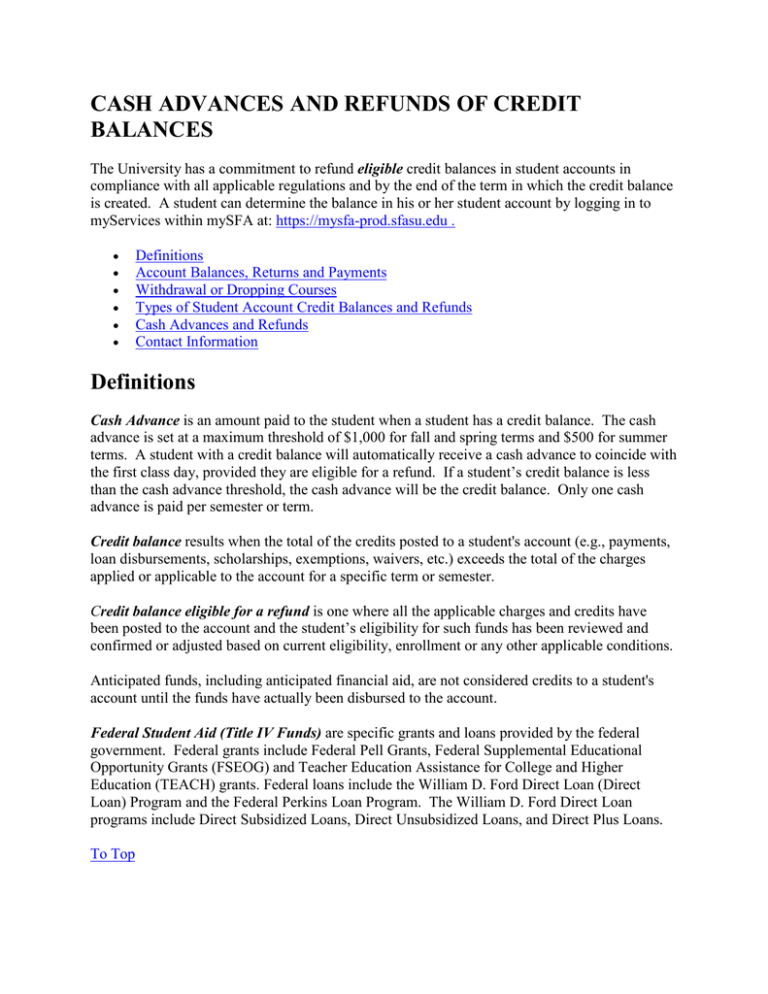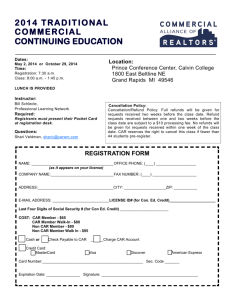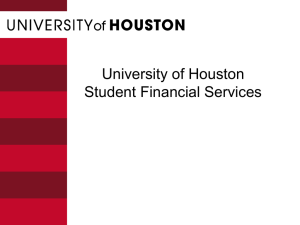CASH ADVANCES AND REFUNDS OF CREDIT BALANCES
advertisement

CASH ADVANCES AND REFUNDS OF CREDIT BALANCES The University has a commitment to refund eligible credit balances in student accounts in compliance with all applicable regulations and by the end of the term in which the credit balance is created. A student can determine the balance in his or her student account by logging in to myServices within mySFA at: https://mysfa-prod.sfasu.edu . • • • • • • Definitions Account Balances, Returns and Payments Withdrawal or Dropping Courses Types of Student Account Credit Balances and Refunds Cash Advances and Refunds Contact Information Definitions Cash Advance is an amount paid to the student when a student has a credit balance. The cash advance is set at a maximum threshold of $1,000 for fall and spring terms and $500 for summer terms. A student with a credit balance will automatically receive a cash advance to coincide with the first class day, provided they are eligible for a refund. If a student’s credit balance is less than the cash advance threshold, the cash advance will be the credit balance. Only one cash advance is paid per semester or term. Credit balance results when the total of the credits posted to a student's account (e.g., payments, loan disbursements, scholarships, exemptions, waivers, etc.) exceeds the total of the charges applied or applicable to the account for a specific term or semester. Credit balance eligible for a refund is one where all the applicable charges and credits have been posted to the account and the student’s eligibility for such funds has been reviewed and confirmed or adjusted based on current eligibility, enrollment or any other applicable conditions. Anticipated funds, including anticipated financial aid, are not considered credits to a student's account until the funds have actually been disbursed to the account. Federal Student Aid (Title IV Funds) are specific grants and loans provided by the federal government. Federal grants include Federal Pell Grants, Federal Supplemental Educational Opportunity Grants (FSEOG) and Teacher Education Assistance for College and Higher Education (TEACH) grants. Federal loans include the William D. Ford Direct Loan (Direct Loan) Program and the Federal Perkins Loan Program. The William D. Ford Direct Loan programs include Direct Subsidized Loans, Direct Unsubsidized Loans, and Direct Plus Loans. To Top Account Balances, Returns and Payments It is the student’s responsibility to ensure that all amounts due the University are paid in a timely manner. Refunds are processed by the University automatically, and are issued based on the amounts due to the student at the time of the refund. In some cases, a refund is issued and subsequently a balance is created in the student’s account. It is the student’s responsibility to return the funds to the University or pay the balance in accordance with the University’s billing and payments policies, including any applicable penalties and late fees. If a student receives funds for which he or she is later determined to be ineligible to receive, it is a student’s responsibility to repay those amounts to the University. Amounts unpaid are subject to the University’s Student Account Receivable policy, and students may be responsible for additional costs related to collection and or attorney fees if the amounts are not repaid timely. Students should visit the University’s Business Office website for information on billing and payments, and contact the Business Office for instructions on how to return funds at 936-468-6960. To Top Withdrawals or Dropping Courses If a student withdraws from the University, the level of Federal Student Aid (Title IV funds) awarded may need to be recalculated by the financial aid office, along with any aid earned or not earned by the student, and returned to the federal source or refunded to the student, depending on the specifics of the situation. Students who withdraw prior to completing 60% of the term for which they received Federal Student Aid may be required to return some or all of the aid they were awarded. The amount of aid will be adjusted based on the date of withdrawal by the financial aid office. These calculations are based on federal return of funds guidelines, and do not necessarily correspond with the University’s refund procedures for tuition and fees, based on a student’s withdrawal date. The University’s refund of tuition and fees procedures are governed by the State of Texas. Federal law requires that Federal Student Aid recipients “earn” the aid they receive by staying enrolled in college at least half time. If a student drops below half time, the level of financial aid may be adjusted by the University’s financial aid office. It is recommended that students who have had a change in enrollment or are withdrawing from the University consult the University’s financial aid office before withdrawing in order to get a preliminary assessment of what costs may be incurred by withdrawing or adjusting a student’s schedule. If a student’s registration is cancelled because they are called to active duty, they will be treated as not being enrolled for the term they are called to active duty. This may impact their eligibility for Federal Student Aid. Similarly, if a student dies during the term, the registration for that term is cancelled, and financial aid may be returned based on the federal return of funds guidelines. Please see the Registrar’s Office website for information on Withdrawing or Dropping All Courses. Tuition and fee refunds for withdrawals and dropped courses are computed differently than the federal return of federal aid calculations. For information on these Refund Processes, please see the Business Office website Tuition and Fee Refund Schedule for Withdrawals and Dropped Courses. To Top Types of Student Account Credit Balances and Refunds Credit balances may be related to payments from several sources, including from personal funds; Federal Student Aid Title IV funds; and non-federal aid funds, such as private loans, state or institutional grants, and other external awards. The University's policies and procedures for handling student account credit balances adhere strictly to federal and other regulatory requirements, as applicable, and vary depending on whether a credit balance is related to Federal Student Aid funds or not. Credit balances may also be related to and affected by changes in a student's enrollment status during a term or semester; changes to expected enrollment status prior to a term, including nonenrollment; changes to academic workload (Add/Drop) that affect federal or other aid eligibility; leaves of absence; or withdrawal. If a student's enrollment status changes as a result of adding or dropping classes, the student's financial award package may need to be adjusted and this may affect the amount of any refunds. Credit Balances and Refunds due to Federal Student Aid: Depending on the specifics of the situation, for students who have a credit balance and are recipients of Title IV federal aid, the level of aid awarded may need to be recalculated by the school's financial aid office. The University will credit Title IV federal aid funds to a student's account only against allowable institutional charges, including: • • • Current charges for tuition and fees, and room and board Other educationally related charges incurred by the student at the University, with the student's (or parent's) written authorization Prior-year charges, up to and not exceeding $200 Students should check the website of the financial aid office, or ask their financial aid counselor, for information on the school's costs of attendance and student budgets. Written Authorization: Students (or parent borrowers) must provide written authorization before the University can perform the following action with respect to credit balances related to Title IV federal aid funds: • • Apply funds awarded for the current year to prior year charges, up to $200 Apply funds awarded to pay for current educationally related charges other than tuition, fees, room and board Students may provide this written authorization by submitting an email request to the SFA Business Office at businesoffice@sfasu.edu. Credit Balances and Refunds Due to Non-Federal Student Aid Funds or Overpayments: If a credit balance on a student's account is related to other, non-Title IV Federal Student Aid funds (for example, external awards, such as scholarships, grants, or private loans) the credit balance in the account may be reduced, may be returned to the source, or may be refunded to the student, depending on the specifics of the situation and the conditions of the award. If a student or parent overpays the student's account, related credit balances will be refunded to the student, regardless of the source of the payment. The only exception is when a refund is from a PLUS loan and the parent has selected for the refund to go to the parent; the refund will not go to the student and will be sent to the parent instead. For students who cancel their enrollment prior to the first class day of the term but have made a payment towards their student account, the credit balance will be refunded to the student. Sponsored (Third-Party) Billing: For students who are sponsored by a third party for whom the University is billing the sponsoring organization through its Third-Party Billing program, the refund may be sent to the sponsoring organization, depending on the conditions of sponsorship. Please contact the Business Office for questions on third-party billing. To Top Cash Advances and Refunds Cash Advances If a student has a credit balance on his or her account prior to the first class day, the university will automatically issue a cash advance to the student of the credit amount up to $1,000 during a fall or spring term and up to $500 during a summer term, unless the student elects not to receive this advance. The amount will automatically be $1,000 or $500 respectively, unless the balance due the student is less than those threshold amounts, in which case the entire balance will be distributed as a cash advance. The University strives to have the cash advance distributed to students by the first class day. Cash advances will be distributed weekly until regular refunds are processed. The cash advance will automatically be sent to the student’s Higher One account and will be distributed in the method selected as soon as the student meets the eligibility requirements to receive a refund. A student can opt out of this automatic cash advance by using the “Cash Advance Opt In/Out” option available in to myServices within mySFA at: https://mysfa-prod.sfasu.edu . A student can change his or her election prior to the first class day. A student can only receive one cash advance each semester or term. Refunds The University's policy is to monitor credit balances regularly and refund eligible credit balances within timelines set by the federal government. The initial refunds are scheduled to occur within 14 days of the start of classes at the beginning of each term. Thereafter, refunds are processed weekly as federal aid or other payments apply to the students’ accounts that may result in a credit balance. SFA also reviews student accounts for accuracy of charges and funds posted, as well as possible pending charges. Students who have outstanding balances due to the university may not be eligible for a refund unless the amounts due the University have been paid in full, and payments exceed the applicable charges. In some instances, refunds will be processed, but a student may owe additional amounts to the university because some charges cannot be paid with Federal Financial Aid. Because of this financial obligation to the University, the student may incur a business office hold placed on their account which may prohibit the student from registering for classes or receiving a transcript. If these amounts are not repaid, the student may incur collection agency costs, including but not limited to any expenses, court costs, collection costs, collection agency fees and any relief to which the University may be entitled. Credit Balances and Refunds due to Title IV Federal Student Aid: The University will automatically issue refunds for eligible credit balances related to Title IV Federal Student Aid funds. Credit balances related to Title IV federal aid funds, per federal regulations, must be refunded no later than 14 days after either: • • The date the credit balance occurred on the student's account, if the credit balance occurred after the first day of class of a payment period, or The first day of classes of the payment period, if the credit balance occurred on or before the first day of class of that payment period. Credit balances related to Title IV funds are always prioritized for refund processing. Issuing Refunds: Refunds will be processed through a third party vendor, Higher One, and will be refunded to the student in the manner in which the student elects to receive refunds: • • Through a direct deposit to their bank account Through their Higher One Card (as a stored value card) Although all Higher One refunds will be processed at the same time, certain students may receive their refund quicker depending on the option that the student elects to receive their refund. For more information on the Higher One refund process, see SFACard Informational Slideshow and the SFACard Activation Instructions Slideshow. If a student has not made an election regarding their refunds, Higher One will return the money to the university within 21 days. Refund checks for students who have not made an election with Higher One will be mailed to the student's address in the University's system based on the following hierarchy: 1. Address for refunds 2. Local address 3. Permanent address In order to ensure that students do not incur a delay in the receipt of their funds, they should take steps immediately upon receipt of their Higher One Card to make the election on how they want to receive their refunds. Any refund will be issued to the student except when a parent has requested that a Federal Parent PLUS loans be refunded to the parent or person that applied for the loan. Otherwise, when funds are placed on the student account, they belong solely to the student and will be refunded to the student. State Holds: The State of Texas requires every state agency to verify that a person is not on state hold before processing a check for that person, unless the check is a payroll check. Cash Advances and Refunds will be held (not processed) if the student is on State Hold and the credit refund is not due to Federal Student Aid. The refunds will be processed after the University receives notification from the State that the state hold has been released. To Top Contact Information The offices and officers of the University responsible for this policy and its administration are: Bobby Williams, Bursar Stephen F. Austin State University Austin Bldg, Suite 204 936-468-6960

